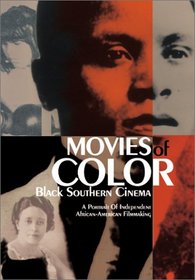| Actors: Cathryn Caviness, Eddie DeBase, Alva Fuller, Rogenia Goldthwaite, Reather Hardeman Director: Spencer Williams Genres: Drama, Science Fiction & Fantasy Sub-Genres: Drama, Science Fiction & Fantasy Studio: Winstar Format: DVD - Color,Full Screen DVD Release Date: 02/04/2003 Theatrical Release Date: 01/01/2002 Release Year: 2003 Run Time: 2hr 42min Screens: Color,Full Screen Number of Discs: 1 SwapaDVD Credits: 1 Total Copies: 0 Members Wishing: 1 MPAA Rating: NR (Not Rated) Languages: English |
Search - Movies of Color - Black Southern Cinema on DVD
  | Movies of Color - Black Southern Cinema Actors: Cathryn Caviness, Eddie DeBase, Alva Fuller, Rogenia Goldthwaite, Reather Hardeman Director: Spencer Williams Genres: Drama, Science Fiction & Fantasy NR 2003 2hr 42min A portrait of independent African-American filmmaking in the southern region of the United States prior to World War II. An incredible body of truly independent filmmaking made under the most hostile set of circumstances, ... more » |
Larger Image |
Movie DetailsSimilar Movies
|
Movie ReviewsBlack Movie History: Excellent Jeffery Mingo | Homewood, IL USA | 07/08/2004 (5 out of 5 stars) "This documentary examines films created by black directors and actors, for black audiences from the start of the 20th century to the Second World War. Here, black and white (plus female and male) film critics discuss various movies from one director to the next. It's jumping off point is that Black Americans not only protested the ultra-racist "Birth of a Nation," but they also produced cinematic work to counteract it. It ends by saying that this film history died with segregation. Who could have known that something so wonderful depended on something so oppressive?Two things about this film surprised me. First, it oddly enough had "Southern" in its title. Though many of the movies discussed spoke of the North and cities as dens of evil and the South as innocent and pure, these films were made during the Great Migration. At no point in the film do they say only Southern black audiences watched these works. Instead of pointing out region, they should have pointed out the time period in the title. All the films discussed were in black and white (being that technicolor wasn't invented until the decade after WWII). Surely, they could have made some catchy title using the term "black and white."Secondly, when discussing Micheaux, they did not focus on interracial romances. I once met a descendant of Micheaux's who gets a paycheck every month based on his ancestor's ouvre. He said most of his films dealt with that topic. In articles on Micheaux, I heard that a classic plot of his movies is that black men and white-looking women can continue their romances once the women find out that they are part black in some way. In this century, decades after the Loving v. Virginia decision, I am surprised that this is omitted. Those type of relationships are generally no longer taboo. So why avoid bringing it up here?As far as I'm concerned, there is no such thing as too many African-American documentaries. Thus, I definitely encourage all black folk, but also any film or history enthusiasts to see this work. We have a history that goes way beyond rappers-turned-actors, Spike Lee, Poitier, and even blaxploitation flicks. This work truly made me proud." An answer I would happily email to J. but Amazon not set f Hunter | Orlando, FL USA | 12/13/2005 (4 out of 5 stars) "Actually there were color films (real as opposed to hand-tinted ) as early as the 20's and the first tech. equivalent was Becky Sharpe in the mid-thirties. But it was expensive - and expense affected all true black film of the period covered in this DVD heavily (expense of sound left Micheaux as the only really indepent black filmmaker after 1930 and it affected strongly reshooting, etc. which resulted in lower quality films). As per the black/white thing - my suspicion is that was left out due to the Micheaux standard that lighter skin was superior to darker (not my theory - see Bowser, Bogle,+ on Micheau)- a feature of both his books and his films. He used the "drop of black blood" about his heroines but he also had his villains darker skinned (for a wonderful modern version of that see Frank's Place episode where Frank is informed that a club he has been invited to join uses the paper bag test.)"
|





